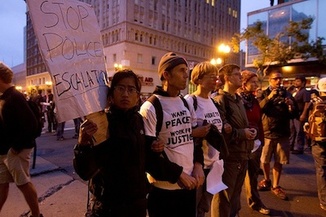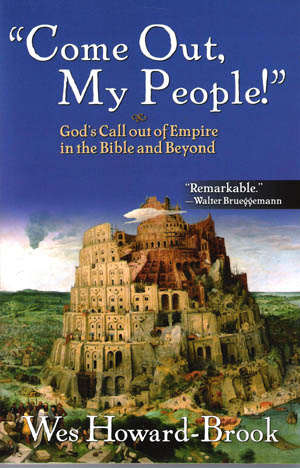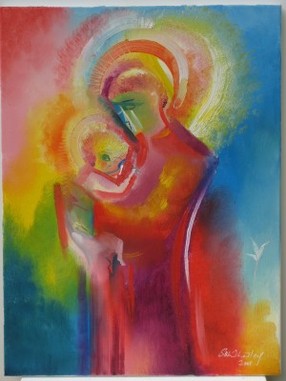Sermon Audio:  I want to turn back now to my own story, to try to share with you some more of my process of liberation. Because I know lots of us here are thinking right now: what about the happy cows, what about the good farmers, what about how my family has raised animals for generations, what about my pasture-raised chickens, what about the Goshen farmer’s market, what about the Amish cheesemakers? Certainly, this isn’t all bad, is it? I asked those same questions for five years, from my first month on Heifer Ranch when I helped kill and process 90 chickens with my friends, to Ash Wednesday of 2014 when I realized I was vegan. But the most important query of all was the one the lawyer asked Jesus in Luke 10, “Who is my neighbor?” Because the gospel makes it clear that our experience of eternal life, our experience of the Beloved Community, depends on our answer to that question. Who is it that gets to participate in our community as neighbor, and conversely, who is it that must participate in our community as a slave, a prisoner, a non-member? I’ve shared about Cinnamon, now I want to tell you about Gloria. Gloria was a pig we took care of at the Ranch. She came to us in the autumn with a couple others, all of them were feeders, piglets who were weaned, weighing about 30 pounds. Gloria and the others were cute, curious, and friendly. Every day through the fall and winter we would bring them scraps from the kitchen to supplement their grain diet. It was such fun to be with the pigs when they were enjoying these treats we brought. Gloria was eating basically what I was eating from the cafeteria. This commonality made Gloria feel to me as if she were a community member. Interacting with her was part of my daily routine, she responded to my touch when I patted her head, and she came up in conversation with other community members. It seemed she was my neighbor, and I thought of her as such.
Comments
6/24/2015 Comments Yellow RibbonsBy: Jarrod Cochran  Being a resident of the State of Georgia, where the School of Americas is located and Lockheed builds its warplanes, I am daily bombarded with buzzwords and catch phrases that demand my knee-jerk, unwavering support of the military industrial complex and the desires/whims of my government. The slogan that is most-often repeated phrase I find on bumper stickers and emblazoned upon business vehicles is “Support Our Troops”. “Support our troops.” What does that mean? How are we supporting our troops? What are we doing to actually provide support? If it is merely a bumper sticker, nice words, or a yellow sticker, that is not true support. If you’re speaking of supporting the troops by expanding medical care for soldiers suffering from physical injuries and mental wounds, then I support the troops. If supporting the troops means getting these men and women off the streets to where they are housed, fed, and cared for then yes, I support the troops. If supporting the troops stands for working to create a more just society where we cease our imperialist reaches and learn to work out our differences through dialogue. If it means that instead of sending out “disposable soldiers” to fight and die for causes of greed, we work to live peaceably with one another, then I support the troops. 10/28/2011 Comments Confessing Pacifism, Repenting in LoveBy: Nichola Torbett  A few weeks ago, I wrote a piece for this website that called for a confessing movement. Consider this my first confession, inspired largely by my participation in Occupy Oakland. Until recently, I have been what one of friends calls a “nonviolence fundamentalist.” Inspired by the movements of Mahatma Gandhi and Martin Luther King, Jr., among others, I have had a deep intuitive sense that our means of social change must be consonant with the ends we wish to achieve. If it is not just a reversal of oppressions that we seek to achieve but a real reign of love, then we must get there without straying from love. I believe this is also the message of the gospel, in which Jesus of Nazareth maintained his commitment to love, manifest in nonviolence, all the way to the cross and beyond, initiating a Reign of Love that is somehow both “at hand” now and yet not fully here, and by the tenants of which I am, as a disciple of Jesus, called to live now, no matter the cost. In an attempt to live out that discipleship, I have chosen to engage in justice struggles only when those struggles have been predicated on a strong commitment to nonviolence; as a result, there have been many movements with which I have not engaged and which I have sometimes even critiqued. These include many led by low-income communities of color. As woman with white-skin privilege and middle-class connections, I must repent of that now. By: Frank Cordaro  I have wanted to read this book for many years. It just was not written yet. Now that it is, we Catholic Workers and faith-based-nonviolent-resistance-to-the-USA-Empire type folks owe Wes Howard-Brook a debt of gratitude. Not since reading Ched Myers’s ground-breaking Binding the Strong Man has a book so influenced my reading of the scriptures. What Myers did with the Gospel of Mark, Howard-Brook does for the whole Bible by laying out a template for reading it. Come Out, My People! addresses two major issues that have plagued my reading of the Bible. The first is the seeming great divide between the New and Old Testaments, or what we Christians have called our “Jewish question.” James Carroll’s book Constantine’s Sword, documents this tragic misreading of the scriptures and the bloody history that has followed. The current political discourse surrounding the State of Israel shows that these issues are still very much with us and not going away anytime soon, My second issue surrounds the question of violence in the Bible. Jack Nelson-Pallmeyer’s book Jesus Against Christianity highlights this perplexing issue well. Nelson-Pallmeyer asks the question, how are we who believe in the nonviolent Jesus and the unconditionally loving God of unlimited forgiveness with the violent deeds attributed to God and God’s people in the Bible? Nelson-Pallmeyer‘s answer is a bold and liberating one. If we really believe in that Jesus and that God, then where ever God is portrayed as violent in both the New and Old Testaments, the violence is human pathology imposed on the text. I find Nelson-Pallmeyer’s answer very appealing. It rings true in my spiritual guts. Yet it is somehow too convenient, too easy a solution. It does not adequately or systematically deal with the Bible’s violent biblical texts. 12/16/2010 Comments The Things that Make for Peace Joy to the world the Lord has come, let earth receive her king! This is the season in which we celebrate the coming of the rebel King of Bethlehem. The one sent in the words of his mother to “bring down rulers from their thrones and to lift up the humble.” During Advent we read passages from the Hebrew prophets that remind us of the alternative future of peace awaiting the people of this earth. But it is a future we can speak of only in symbols, metaphors, and parables. It is a future too big for our words. It is a future too big for our imaginations. It is a future too big for our faith. But how will we ever get there? Where is the path away from the graveyards of the past? Where is the path through the maze of the present? Where is the path that will bring us into that clearing where the light of God shines unhindered and we flourish in its radiance fulfilling that ancient word of Irenaeus who said, “the glory of God is humanity – fully alive!” Our initial response to that question is “We do not know.” We admit that in light of our finitude, our confusion, and perhaps even our shame, we simply to do not know how to get there. |
Disclaimer
The viewpoints expressed in each reader-submitted article are the authors own, and not an “official Jesus Radicals” position. For more on our editorial policies, visit our submissions page. If you want to contact an author or you have questions, suggestions, or concerns, please contact us. CategoriesAll Accountability Advent Anarchism Animal Liberation Anthropocentrism Appropriation Biblical Exegesis Book Reviews Bread Capitalism Catholic Worker Christmas Civilization Community Complicity Confessing Cultural Hegemony Decolonization Direct Action Easter Economics Feminism Heteropatriarchy Immigration Imperialism Intersectionality Jesus Justice Lent Liberation Theology Love Mutual Liberation Nation-state Nonviolence Occupy Othering Pacifisim Peace Pedagogies Of Liberation Police Privilege Property Queer Racism Resistance Resurrection Sexuality Solidarity Speciesism Spiritual Practices Technology Temptation Veganism Violence War What We're Reading On . . . White Supremacy Zionism ContributorsNekeisha Alayna Alexis
Amaryah Armstrong Autumn Brown HH Brownsmith Jarrod Cochran Chelsea Collonge Keith Hebden Ric Hudgens Liza Minno Bloom Jocelyn Perry Eda Ruhiye Uca Joanna Shenk Nichola Torbett Mark VanSteenwyk Gregory Williams Archives
October 2017
|
Search by typing & pressing enter

 RSS Feed
RSS Feed